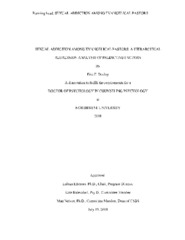Sexual Addiction Among Evangelical Pastors: A Hierarchical Regression Analysis of Predictive Factors
Abstract
There are a limited number of empirical studies about sexual addiction in general, and among evangelical pastors, information is extremely scarce. Yet the uniqueness of this population in terms of spirituality and religion make it an ideal one to study. Given that their congregants may also suffer from the same affliction, a clearer understanding about the nature of sexual addiction may result in the problem coming further into the light and sufferers receiving more effective treatment. A one-time online survey was administered to evangelical pastors. Analysis of the 125 surveys completed by those meeting inclusion criteria (84.8% male, 15.2% female) indicated that 41.2% of the sample (n=40) met a clinical cutoff for sexual addiction (97.5 % of which were male), and 9.3% (n=9, all males) met a more stringent research cutoff for sexual addiction. Further, Negative Religious Coping and insecure attachment were positively correlated with sexual addiction, although spirituality was not. Higher levels of Negative Religious Coping and insecure attachment predicted higher sexual addiction scores. Specifically, gender (male), attachment classification (preoccupied), and religious coping (higher negative coping) predicted significantly higher scores on the SAST-R scale measuring sexual addition; the model as a whole explained 9.3 % of the variance in those scores. Recommendations for denominations and counselors are provided as well as suggestions for future research.
Original item type
PDF
Original extent
xi, 165 pages
Collections
Copyright
This original work is protected by copyright. Copyright is retained by the author(s). Works may be viewed, downloaded, or printed, but not reproduced or distributed without author(s) permission.


 Maintained by the Northwest University Library
Maintained by the Northwest University Library